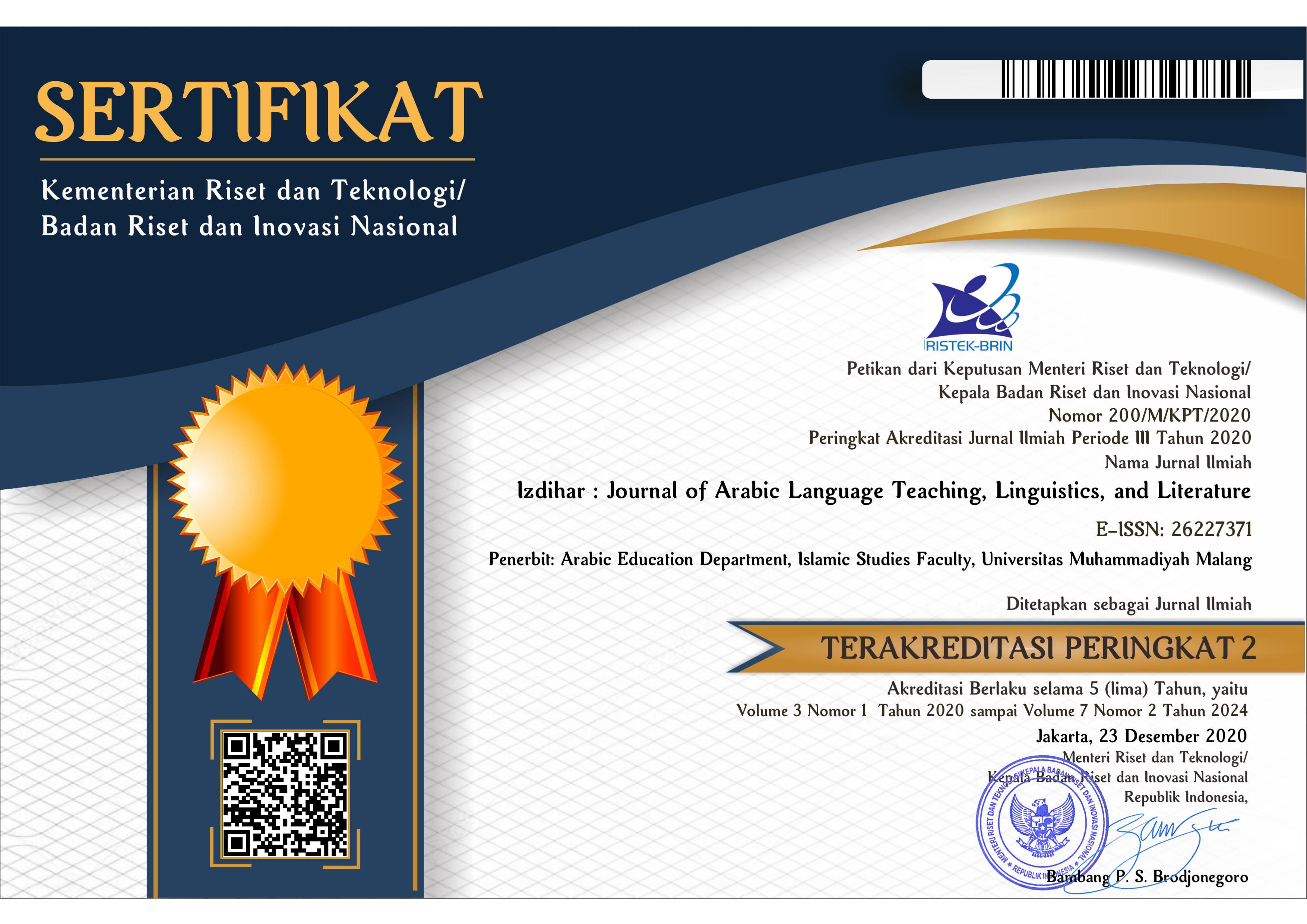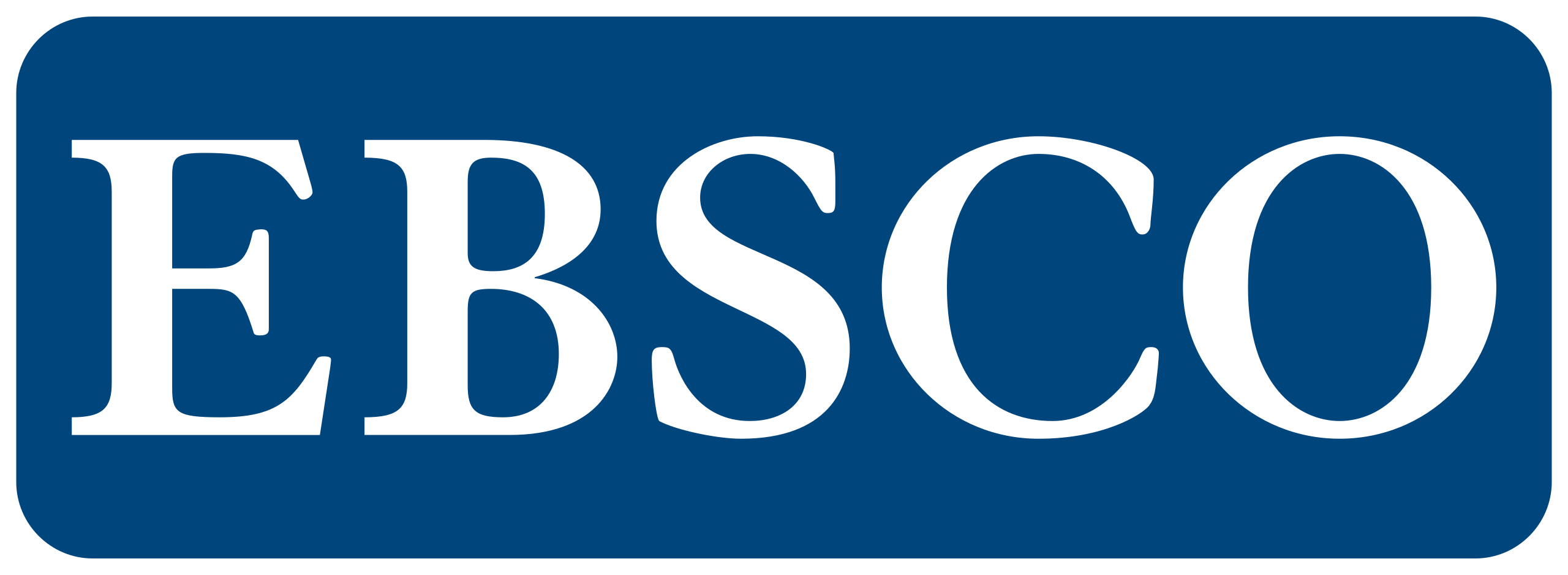Fun Learning Arabic Speaking Skills Using Kinemaster Video
DOI:
https://doi.org/10.22219/jiz.v4i3.17851Keywords:
Arabic Skills, Fun Learning, Kinemaster, VideoAbstract
The purpose of this study was to describe how to implement fun learning Arabic speaking using kinemaster video and measure its effectiveness. This research was conducted with a grounded theory qualitative approach. The implementation of this method was carried out on students in grades VII–XI of MTs Muhammadiyah Depok. Methods of data collection included interviews (with the school) and observations (of students' learning conditions).Meanwhile, the data analysis method used three steps, namely data reduction, analysis, and conclusion. The results of this study stated that this fun learning Arabic speaking skills was stimulated by kinemaster video. All materials were included in the video of the drilling process being carried out. After the implementation of the activities, students considered Arabic to be fun, increasing their score to 67% from the initial 33% who thought that learning Arabic was fun. The incoming data said that learning Arabic was very difficult. The meaning was down from the original 65%, while those who think Arabic was boring fell to 31% from the original 69%, and the data also showed a decrease in the very monotonous Arabic learning method, which was originally 63%, now only 37%. These results indicated that the improvement of students' speaking skills should be accompanied by interesting and fun learning methods.
Downloads
References
Amrullah, A. R., Suryanti, S., & Suprapto, N. (2021). The Development of KineMaster Animation Video as a Media to Improve Science Literacy in Elementary Schools. PENDIPA Journal of Science Education, 6(1), 151–161. https://doi.org/10.33369/pendipa.6.1.151-161
Arquitectura, E. Y., Introducci, T. I., 赫晓霞, Iv, T., Teatinas, L. A. S., Conclusiones, T. V. I. I., Contemporáneo, P. D. E. U. S. O., Evaluaci, T. V, Ai, F., Jakubiec, J. A., Weeks, D. P. C. C. L. E. Y. N. to K. in 20, Mu, A., Inan, T., Sierra Garriga, C., Library, P. Y., Hom, H., Kong, H., Castilla, N., Uzaimi, A., … Waldenström, L. (2015). No 主観的健康感を中心とした在宅高齢者における 健康関連指標に関する共分散構造分析Title. Acta Universitatis Agriculturae et Silviculturae Mendelianae Brunensis, 53(9), 1689–1699. http://publications.lib.chalmers.se/records/fulltext/245180/245180.pdf%0Ahttps://hdl.handle.net/20.500.12380/245180%0Ahttp://dx.doi.org/10.1016/j.jsames.2011.03.003%0Ahttps://doi.org/10.1016/j.gr.2017.08.001%0Ahttp://dx.doi.org/10.1016/j.precamres.2014.12
Astuti, W. (2016). Berbagai Strategi Pembelajaran Kosa Kata Bahasa Arab. In Jurnal Komunikasi dan Pendidikan Islam, 5(2), 178–190. https://doi.org/10.36668/jal.v5i2.38
Ermanto, & Zulfadhli. (2019). Peningkatan Kemampuan Publikasi Jurnalistik Perangkat Nagari Menggunakan Aplikasi KineMaster untuk Media Sosial di Nagari Tuik IV Koto Mudiek dan Nagari Sungai Nyalo IV Koto Mudiek Kecamatan Batang Kapas Kabupaten Pesisir Selatan melalui Pelatihan. In Abdi Humanora: Jurnal Pengabdian Masyarakat Bidang Humaniora, 1(1), 9–13. http://ejournal.unp.ac.id/index.php/abdi-humaniora/article/view/106660
Fitrilia, I., & Rohani, T. (2021). Peningkatan Motivasi Dan Hasil Belajar Siswa Di Masa Pandemi Covid 19 Dengan Media Pembelajaran KineMaster Di SMP Negeri 8 Pagar Alam. Jurnal Sains Sosio Humaniora, 5(2), 793–797. https://doi.org/10.22437/jssh.v5i2.15786
Haryudin, A., & Imanullah, F. (2021). the Utilization of KineMaster Applications in the Making of Multimedia Based Teaching Materials for English E-Learning in New Normal (Covid-19). PROJECT (Professional Journal of English Education), 4(2), 341. https://doi.org/10.22460/project.v4i2.p341-352
Khaira, H. (2011). Media Pembelajaran Audio Visual. 3, 4–5. http://digilib.unila.ac.id/3817/17/BAB II.pdf
Makmuroh, U. (2021). Digital Training of KineMaster Application for Learning Video: Perspectives From Kindergarten School Teachers. International Journal of Research in Education, 1(2), 121–128. https://doi.org/10.26877/ijre.v1i2.8612
Marleny, F. D., & Ningrum, A. A. (2021). Pengembangan Media Pembelajaran Berbasis Aplikasi KineMaster untuk Menunjang Belajar Mengajar Siswa Pada Gugus 6 Pirus Martapura. Informatika:Jurnal Pengabdian Masyarakat, 2(3), 2–7. https://ejournal.unwaha.ac.id/index.php/abdimas_if/article/view/2086.
Mufidah, N., Isyaty, I., Kholis, N., & Bin Tahir, S. Z. (2019). Ict for Arabic Learning: a Blended Learning in Istima' Ii. In لسـانـنـا (LISANUNA): Jurnal Ilmu Bahasa Arab dan Pembelajarannya (Vol. 8, Issue 2, p. 174). https://doi.org/10.22373/ls.v8i2.4561
Mulyadi, M. (2013). Penelitian Kuantitatif Dan Kualitatif Serta Pemikiran Dasar Menggabungkannya. Jurnal Studi Komunikasi dan Media, 15(1), 128. https://doi.org/10.31445/jskm.2011.150106
Sarip, N. (2012). Problematika Pembelajaran Bahasa Arab. An-Nida:Pemikiran Islam, 37(1), 82–87. http://dx.doi.org/10.24014/an-nida.v37i1.315
Nugrawiyati, J. (2018). Media Audio-Visual Dalam Pembelajaran Bahasa Arab Pendahuluan Definisi Media Pembelajaran. El-Wasathiya:Jurnal Studi Agama, 6(1), 97-111. https://doi.org/10.5281/zenodo.3523167
Octavianty, R., Astuti, A., Hikma, R. S., Iwan, M., & (2021). Pelatihan Pembuatan Media Pembelajaran Audio Visual Menggunakan Aplikasi KineMaster guna Meningkatkan Minat Belajar Siswa SDN 26 Watang Palakka. Journal Lepa-Lepa, 1(1), 280–286). https://ojs.unm.ac.id/JLLO/article/view/17283
Sari, E. S. I., Nurbaiti, S., & Rohani. (2022). Improvements of Learning Motivation and Students Learning Outcomes in Islamic Religious Education Subjects Through the Use of Learning Video Media KineMaster at Elementary School State 2 Susunan Baru Bandar Lampung. Proceedings of the Universitas Lampung International Conference on Social Sciences (ULICoSS 2021), 628(ULICoSS 2021), 328–331. https://doi.org/10.2991/assehr.k.220102.041
Syamaun, N. (2015). Pembelajaran Maharah al-Kalam untuk Meningkatan Keterampilan Berbicara Mahasiswa Program Studi Pendidikan Bahasa Arab Fakultas Tarbiyah dan Keguruan UIN Ar-Raniry Banda Aceh. Lisanuna: Jurnal Ilmu Bahasa Arab dan Pembeljarannya, 4(2), 343-359. http://dx.doi.org/10.22373/l.v4i2.852
Tan, S. L., Cheng, P. L., Soon, H. K., Ghazali, H., & Mahyudin, N. A. (2013). A qualitative study on personal hygiene knowledge and practices among food handlers at selected primary schools in Klang valley area, Selangor, Malaysia. International Food Research Journal, 20(1), 71–76. http://www.ifrj.upm.edu.my/volume-20-2013.html
Downloads
Published
How to Cite
Issue
Section
License
Copyright (c) 2021 Fitri Liza, Miatin Rachmawati, Ayman Shahrour, Izdihar : Journal of Arabic Language Teaching, Linguistics, and Literature

This work is licensed under a Creative Commons Attribution-ShareAlike 4.0 International License.
Copyright Notice
Authors who publish with this journal agree to the following terms:
- Authors retain copyright and grant the journal right of first publication with the work simultaneously licensed under a Creative Commons Attribution-ShareAlike 4.0 International License that allows others to share the work with an acknowledgment of the work's authorship and initial publication in this journal.
- Authors are able to enter into separate, additional contractual arrangements for the non-exclusive distribution of the journal's published version of the work (e.g., post it to an institutional repository or publish it in a book), with an acknowledgment of its initial publication in this journal.
- Authors are permitted and encouraged to post their work online (e.g., in institutional repositories or on their website) prior to and during the submission process, as it can lead to productive exchanges, as well as earlier and greater citation of published work (See The Effect of Open Access).
Copyright (c) 2019 Izdihar : Journal of Arabic Language Teaching, Linguistics, and Literature

This work is licensed under a Creative Commons Attribution-ShareAlike 4.0 International License.

















